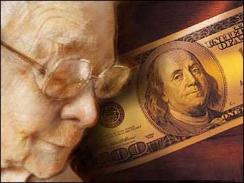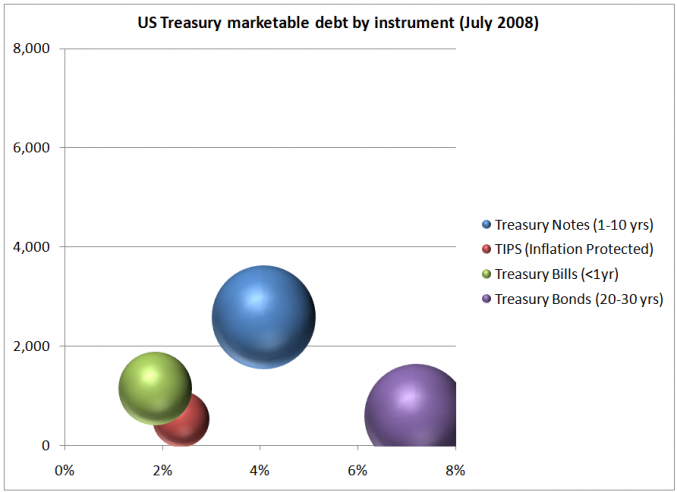George Soros has just fired the Warning shots
"That is a role that Germany has been eager to avoid and remains unwilling to accept. But Germany has no real choice. A breakdown of the euro would precipitate a banking crisis that would be beyond the global financial authorities’ ability to control. The longer Germany takes to recognize this, the higher the price it will have to pay." Click here for entire article...
The Media Admits To Ignoring Ron Paul
 Why?
Because if "the unelectable one" were to become president, the
financial kleptocratic, oligarchic status quo, which just so happens is
the big legacy media's biggest advertising base, would be wiped out
overnight. Next up: big media becomes very small media. The clip below
from CNN explains it all.
Why?
Because if "the unelectable one" were to become president, the
financial kleptocratic, oligarchic status quo, which just so happens is
the big legacy media's biggest advertising base, would be wiped out
overnight. Next up: big media becomes very small media. The clip below
from CNN explains it all.The Sun Chairman, What's Future Is Prologue, And Why The Second French Revolution Is Coming To America

For our closing post of the day we once open the floor to Sean Corrigan who proves that just when we thought all historical comparisons to the current deplorable economic miasma have been used up, a new one springs up, this time perhaps the one most indicative not so much of the past but of the future. Indeed, if history is any indication, and it is, America's catastrophic and untenable position is worse than even that of one Louis XIV, better known as "The Sun King", whose rule set the stage for the downfall of the French monarchy and which ultimately culminated with the French Revolution of 1789. For arguably the best indication of historical parallels to the present, and yet another confirmation that there really is nothing new in this world, especially in the world of central planning of monetary affairs, we present the following summary of the practices of Louis XIV which is verbatim applicable to the actions of the current central planning cartel: "The administration of the finances appears to have practised a subtle and ingenious tactic… [and] by modifications in the monetary unit, attempted to influence economic phenomena. Changes… were made to prepare for the issue of loans or to audit the circulation of the treasury notes, or to regulate exchange, to modify the balance of trade… to effect a redistribution of wealth, to influence the price level of commodities, perhaps to attenuate economic crises and famines…" It may come as a surprise to some that the very same type of central planning that Bernanke, and his central banking brethren, are trying to inflict (and failing) upon the world, was the same that was attempted on so many occasions in history, most poignantly, and catastrophically in the late stages of the French monarchy. And unfortunately, that's just the beginning of the parallels...

I wonder what goes through Ben Bernanke’s mind as he sits in his gold plated boardroom in the majestic Marriner Eccles building in Washington DC and decides to screw grandmothers in order to further enrich Wall Street bankers. He just pledged to keep interest rates at zero percent for two more years. Ben is a supposedly book smart man. Does he have no guilt or shame for what he has wrought? How does he sleep at night knowing he has created bloody revolutions around the globe due to his inflationary zero interest policy? People are dying because he has decided that an elite group of Wall Street bankers who recklessly brought down the worldwide financial system in 2008 deserve to be kept alive and enriched at the expense of the many.
At 50x Leverage And 2% Tier 1 Capital, Is SocGen Truly A Paragon Of Balance Sheet Invincibility?

The fact that European banks have just a tad more leverage compared to their US cousins has been well-known for quite some time. One need merely to look at the chart from our February 2010 post to see how American financial institutions stack up relative to European ones as a %-age of host country GDP. This issue came to a very violent head last week when market participants finally realized the painfully obvous, namely that even without direct Greek exposure (and there certainly is a lot of that), SocGen is simply not a viable business model for the long-run courtesy precisely of its tremendous leverage. And unfortunately, while SocGen's CEO was quick to appear on any TV station that would have him and deny rumors of the bank's viability, he had little if anything to say about the bank's actual solvency and leverage. Alas, therein lies the rub. As the attached table created by Jean-Piette Chevalier demonstrates, SocGen is back at the leverage it had back in 2007 at just over 50x. As a reminder, not even Lehman was this bad when it blew up (and that excludes the beneficial boost from Repo 105). In other words, SocGen has a Tier ratio of 2.0%... a number which the bureaucrats at Basel will have no choice but tell the bank must go up. And go up it will... assuming SocGen can issue €84 billion in new capital to pad its equity (on €19 billion of market cap... mmhmmm). Of course, in order to raise capital, SocGen would have to admit that the market was, in fact, correct in its assessment that the bank was undercapitalized, which would then send the stock even lower, and so forth, chicken or egg style. While we doubt any of this is new to the market, we doubt the response will be one of buying euphoria. Luckily, the only thing that can send the price tumbling now is actual selling, as opposed to shorting. And as we all know, nobody could possibly sell stocks: after all it is simply the evil shorters who are responsible for every market collapse in history, never the long idiot money which never did its homework, and suddenly becomes the last bagholder standing and first to bail from what is obviously a disastrously bad investment.
Eurobonds Ruled Out; Eurobong Still In Play
Not even minutes after we finished ridiculing Springer/Die Welt's attempt at propaganda spin whereby eurobonds were actually presented as not only good for Germany, but about to be "instituted" (and fully expected the immediate response to be one of refutation via official channels), here comes the FT with the official denial: "Germany and France are ruling out common eurozone bonds to solve the bloc’s current debt crisis, in spite of renewed pressure ahead of a meeting of chancellor Angela Merkel and president Nicholas Sarkozy on Tuesday. Wolfgang Schäuble, German finance minister, made clear in an interview with Der Spiegel, that Berlin remains opposed to such a policy. “I rule out eurobonds for as long as member states conduct their own financial policies and we need different rates of interest in order that there are possible incentives and sanctions to enforce fiscal solidity,” he said. So, uh, Die Welt's prognostication that "The federal government is now willing, if necessary, to accept a Eurobond transfer union" is about, oh, 100% wrong? Oops. As for those expecting an announcement of a eurobond on Tuesday following the latest round of "emergency" Merkel-Sarkozy, we suggest you put down the Eurobong: "Senior French officials also played down speculation that any firm announcement on jointly issued bonds would be issued after meetings when Ms Merkel comes to Paris on Tuesday. “Eurobonds would require a much more determined integration of budgetary policy,” one said. “We do not have that today. It could be a long-term project, but you cannot have eurobonds and at the same time national economic and budgetary policies.” Translation: "there is this thing called elections coming, and some of us career politicians, who have no idea how to do anything actually valuable for society, and still have not plundered enough in the form of bribers, pardon, lobby money, are not insane enough to propose that German and France foot the bill for the entire European bailout." Even though that is precisely what they will do via the EFSF. And we certainly expect yet another round of eurobond rumors the next time the EURUSD tumbles by 200 pips in the span of 10 minutes (which courtesy of the broken FX market as described by Sean Corrigan earlier, is roughly every several hours).Guest Post: How Dr. Ben Copperfield Makes Trillions Disappear - Twice

Fed Chairman Ben Bernanke is a magician. He can make trillions of debt disappear. Impossible? Let me show you how...
Italy Is The New Greece, As Strikes Shift From Syntagma Square To Rome
Remember when on Friday, following the summary of the proposed Italian austerity measures, we said that "within a few weeks we expect the strike (and riot)-cam to be planted firmly in the Piazza Navona and across the streets ot the Trastevere in capturing the latest round of European indignation" and some assumed this was yet more sarcasm? Nope. As the AP reports, "the leader of Italy's largest union is threatening a general strike against an austerity package that Premier Silvio Berlusconi's government hastily pushed through to balance the budget by 2013 and avoid financial collapse. The threat came amid mounting criticism Sunday of the euro45.5 billion ($64.8 billion) package passed Friday in response to demands by the European Central Bank." Incidentally, $64.8 billion in cuts... out of $1.8 trillion in debt....that makes even the farcical $2.1 trillion deficit cut plan passed by the muppets in DC appear gargantuan in context. What happens when S&P tells Italy it has to increase the cuts fivefold to avoid more downgrades? At that point the strikes in Italy will be 24/7/365. And what happens when S&P wakes up and realizes that the same is applicable for France, and that any realistic cuts will force French GDP, which on Friday came at a very disappointing 0.0%, to turn wildly negative, as strikes next shift from Rome to Paris... Just how stable will that vaunted AAA rating of France be at that point? But of course, nobody will have been able to see it coming.Next Week's Market Charts That Matter

As usual, the most comprehensive stack of technical analysis comes from Goldman's John Noyce who is rarely afraid to go out on a limb. Among the key charts to track, number one is the VIX which recently blew out to prior resistance levels at the 49 mark, which happens to have been the peak during the October 1997 Asian Crisis, the October 1998 LTCM crisis, September 11, the July 2002 equity bear market, and the first Eurozone insolvency in May 2010. For now this level has held, and with major central planner intervention it appears that a base is now being built below it. Of course, all this means is that when the current round of global intervention fails the deferred risk will simply send the VIX to new unseen heights. The only question is when.
![[Most Recent Quotes from www.kitco.com]](http://www.kitconet.com/charts/metals/gold/t24_au_en_usoz_2.gif)
![[Most Recent Quotes from www.kitco.com]](http://www.kitconet.com/charts/metals/silver/t24_ag_en_usoz_2.gif)
No comments:
Post a Comment